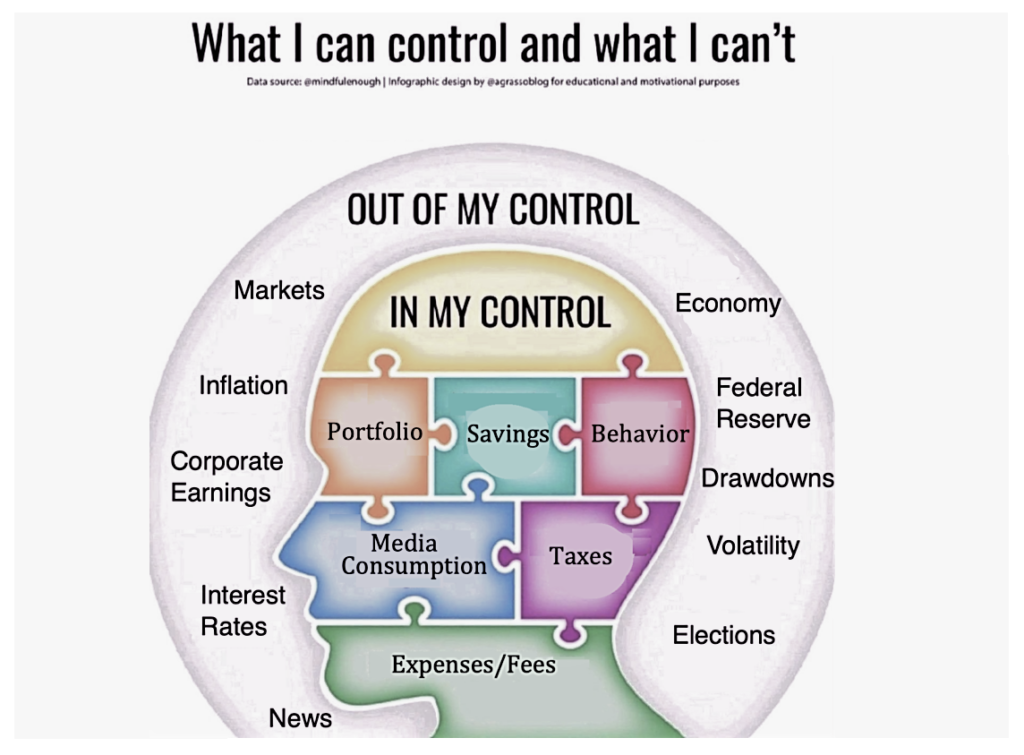27 de setiembre, 2022.
Sobre el autor: Barry Ritholtz
¿QUÉ COSAS ESTÁN BAJO NUESTRO CONTROL?
La semana pasada los mercados accionarios globales perdieron 5% o mas. Desde comienzos de año el índice S&P 500 viene perdiendo más de 23%; el Russell 2000 small caps más de 26%; Mercados emergentes han caído casi 28%; y el índice de tecnología Nasdaq mas de 31%. Dejando las bromas de lado, setiembre haciendo honor a su reputación, ha sido un mes desafiante para las acciones.
Con frecuencia me preguntan como me afecta a mí el mercado – mi mente, mis emociones, y mi comportamiento. Mi respuesta es breve y muy Zen: Entiendo qué cosas no puedo controlar, y me adapto a ello.

Hablemos de ese enfoque Zen de reconocer lo que realmente está bajo nuestro control y las cosas sobre las cuales no tenemos absolutamente ninguna influencia en sus resultados. Es notable que la mayoría de lo que discutimos, leemos, escuchamos y vemos son cosas fuera de nuestro control.
Que cosas NO podemos controlar:
Mercados: En primer lugar, no tenemos ningún control sobre los mercados. Ninguno en absoluto. Nuestras compras y ventas, ya sean de unos pocos miles o incluso millones de dólares en acciones, no impactan los mercados de capitales que valen billones de dólares. Los mercados harán lo que hagan sin importar nuestra insignificante existencia.
Economía: PBI, contrataciones y salarios, gasto del consumidor, producción industrial, construcción de viviendas, y así sigue la lista. Como uno de los 330 millones de personas, nuestro nivel de gasto ni siquiera es un error de redondeo.
¿Necesito continuar? Tal vez contribuyas a la inflación, pero es infinitesimal; seguramente no tenemos ninguna influencia en la Reserva Federal o en las tasas de interés. ¿El iPhone que acabo de comprar? No va a impactar las ganancias corporativas ni un ápice. Del mismo modo, incidimos ni mínimamente en la volatilidad o en las caídas; ciertamente, no tenemos ningún impacto en lo que se reporta en las noticias, ni determinaremos el resultado de las elecciones nacionales o locales.
Que cosas SI podemos controlar:
Nuestro Portafolio: Queremos tener un portafolio lo suficientemente robusto para soportar caídas y recesiones; no necesariamente el mejor conjunto de activos posible, sino aquellos con los que podamos vivir día tras día. Esto significa que debe ser adecuado para el nivel de riesgo con el que nos sintamos cómodos. Esto incluye una asignación de activos amplia que incluya una diversificación completa de clases de activos, geografías, etc.
Entonces debemos tener un plan financiero, para que quede claro para qué estamos invirtiendo, y así podamos ver cómo estamos progresando hacia esos objetivos.
Debemos ahorrar suficiente en relación con nuestros ingresos, viviendo dentro de nuestras posibilidades.
Lo que consumimos en los medios de comunicación también está bajo nuestro control: ¿estás leyendo demasiado pesimismo extremo? ¿o quizás opiniones muy sesgadas? Es probable que esto esté afectando tu perspectiva de manera negativa.
Todo se reduce a un aspecto importante que esta bajo tu control: tu propio comportamiento.
Si podes dominar eso, es casi imposible que no tengas éxito como inversor en el largo plazo.


